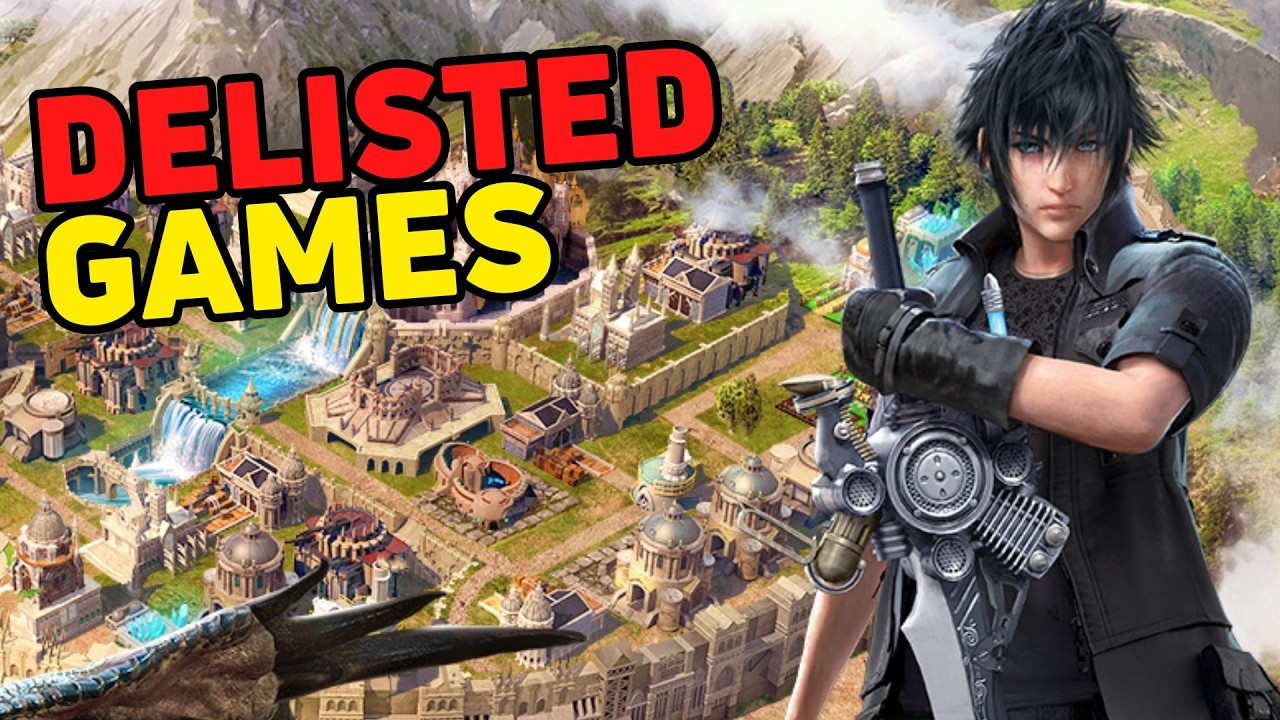Final Fantasy fans, brace for heartbreak! 😢 Seven incredible titles from this legendary series have been delisted, locked away from new players forever. From mobile gems like Final Fantasy Record Keeper to console classics like Final Fantasy XI’s original versions, these games are gone due to server shutdowns, licensing issues, and digital store purges. Why do great games vanish like this? Is Square Enix abandoning its legacy? Share your fave lost FF game in the comments and let’s reminisce! 🗡️✨
Don’t let these stories fade—dig into the details and keep the legacy alive!
The Final Fantasy series, a cornerstone of gaming since 1987, has captivated millions with its rich stories, iconic characters, and innovative mechanics. Spanning decades, Square Enix’s flagship franchise has produced mainline titles, spin-offs, and mobile experiments, many of which remain beloved. However, not all Final Fantasy games have stood the test of time. Some have been delisted from digital stores, shut down, or rendered unplayable due to technical, legal, or business decisions. This article explores seven such Final Fantasy titles that are no longer accessible, the reasons behind their disappearance, and the broader implications for game preservation.

The Fragility of Digital Gaming
The rise of digital distribution and live-service models has transformed gaming, offering convenience but also vulnerability. Unlike physical cartridges or discs, digital games depend on active servers, licensing agreements, and platform support. When these elements lapse, games can vanish, leaving players unable to access titles they purchased. Final Fantasy, with its expansive catalog and forays into online and mobile gaming, has not been immune. The seven delisted games below highlight the challenges of preserving modern games in an era of fleeting digital ecosystems.
1. Final Fantasy Record Keeper
Final Fantasy Record Keeper (2014) was a mobile love letter to the series, letting players relive iconic moments through a pixel-art lens. Players built teams of classic characters, from Cloud to Lightning, to tackle battles drawn from the franchise’s history. Its nostalgic charm and gacha mechanics drew a dedicated fanbase, with millions downloading it across iOS and Android.
In 2022, Square Enix announced the game’s shutdown, citing unsustainable maintenance costs. The servers closed on September 29, 2022, rendering the game unplayable. As a single-player experience tied to online servers, Record Keeper couldn’t survive offline, a common fate for mobile titles. Fans mourned the loss of a game that celebrated Final Fantasy’s legacy, with no official way to preserve its content.
2. Final Fantasy Brave Exvius
Final Fantasy Brave Exvius (2015) blended original characters with series staples in a mobile RPG with turn-based combat and gacha elements. Its story, centered on heroes Rain and Lasswell, earned praise for its depth, while collaborations with pop stars like Ariana Grande added flair. The game thrived for nearly a decade, amassing a global following.
However, Square Enix shuttered the global version in October 2024, citing difficulties in maintaining service quality. The Japanese version continues, but for non-Japanese players, the game is inaccessible. Its reliance on live servers means even downloaded copies are now defunct, leaving fans unable to revisit their progress or story.
3. Final Fantasy XI (Original Console Versions)
Final Fantasy XI (2002) was a groundbreaking MMORPG, bringing the series into the online realm. Launched on PlayStation 2 and PC, it later expanded to Xbox 360. Its vast world of Vana’diel and complex job system captivated players, with some dedicating decades to its community.
The game’s console versions were delisted in 2016 when Square Enix ended PS2 and Xbox 360 support. While the PC version remains active, the original console experience—complete with its unique community dynamics and hardware quirks—is gone. Licensing issues and outdated server infrastructure made maintaining these versions impractical, locking out players without PC access.
4. Final Fantasy XIV (Version 1.0)
Final Fantasy XIV (2010) is now a celebrated MMORPG, but its original release was a disaster. Plagued by clunky gameplay, server issues, and a convoluted interface, it alienated players and critics. Square Enix took the unprecedented step of rebooting the game as A Realm Reborn in 2013, salvaging its reputation.
The original Final Fantasy XIV (Version 1.0) was shut down in 2012, and its servers are long gone. While A Realm Reborn improved the experience, Version 1.0’s unique, flawed world is inaccessible, preserved only in memories and archived footage. Its delisting reflects the challenges of maintaining early MMORPGs, especially those requiring constant server upkeep.
5. Final Fantasy All the Bravest
Final Fantasy All the Bravest (2013) was a controversial mobile spin-off, featuring simplified battles where players tapped sprites of classic characters to fight waves of enemies. Criticized for its shallow gameplay and heavy microtransactions, it still found a niche audience for its nostalgic roster and retro aesthetic.
The game was removed from iOS and Android stores in 2019, with no official explanation from Square Enix. Its reliance on in-app purchases and lack of offline functionality made it unsustainable. Today, even those who purchased it cannot play, as updates ceased and compatibility with modern devices eroded.
6. Final Fantasy Dimensions II
Final Fantasy Dimensions II (2015), originally titled Final Fantasy Legends II in Japan, was a mobile RPG with a time-travel narrative and turn-based combat. Its chibi art style and premium price tag (with later free-to-play elements) set it apart from gacha-driven peers. The story, following heroes Morrow and Aemo, resonated with fans of classic Final Fantasy storytelling.
Square Enix ended support in 2020, delisting it from app stores. Like other mobile titles, its online components made offline play impossible. The game’s niche status and high maintenance costs likely contributed to its demise, leaving another Final Fantasy story lost to time.
7. Mobius Final Fantasy
Mobius Final Fantasy (2015) was a visually stunning mobile RPG with a card-based combat system and a story about a warrior named Wol in the world of Palamecia. Its high production values and console-quality graphics set a new standard for mobile gaming, earning critical acclaim.
The global version shut down in June 2020, following the Japanese version’s closure. Square Enix cited rising operational costs and declining player numbers. As a live-service game, Mobius became unplayable, with no offline mode to preserve its narrative or mechanics. Its loss stung fans who saw it as a bold experiment in the series.
Why Do Games Get Delisted?
The delisting of these Final Fantasy titles stems from several factors. First, live-service games like Record Keeper, Brave Exvius, and Mobius rely on active servers, which incur ongoing costs. When player numbers drop or maintenance becomes unprofitable, companies often pull the plug. Second, licensing agreements, particularly for older console games like Final Fantasy XI’s PS2 version, can lapse, making re-releases complex. Third, mobile games face compatibility issues with evolving operating systems, as seen with All the Bravest and Dimensions II. Finally, strategic shifts at Square Enix, such as prioritizing new projects over legacy support, play a role.
The broader gaming industry mirrors these trends. Digital storefronts like the PlayStation Store and Nintendo eShop regularly remove titles due to licensing disputes or platform closures. The shift to digital-only distribution amplifies the risk, as players no longer own physical copies that can outlast server shutdowns.
The Impact on Fans and Preservation
For Final Fantasy fans, the loss of these games is deeply personal. Record Keeper and Mobius preserved the series’ history in unique ways, while Final Fantasy XI’s console versions fostered tight-knit communities. Players who invested time, money, and emotion into these titles are left with memories but no way to revisit them. The inability to access Version 1.0 of Final Fantasy XIV also erases a piece of the series’ complex history, flawed as it was.
Game preservation is a growing concern. Unlike films or books, games often depend on specific hardware, software, or servers, making them vulnerable to obsolescence. Efforts like fan servers for Final Fantasy XI or emulators for older titles exist, but they operate in legal gray areas and can’t fully replicate the original experience. Square Enix has occasionally re-released classics, such as the Pixel Remaster series, but delisted mobile and online games rarely return due to technical and financial barriers.
Can These Games Be Saved?
Reviving these titles is challenging but not impossible. Square Enix could explore offline modes for mobile games, as seen with some gacha titles that offer limited post-shutdown playability. For MMORPGs like Final Fantasy XI’s console versions, private servers or remastered editions could restore access, though licensing hurdles remain. Final Fantasy XIV’s Version 1.0 is trickier, as its codebase was overhauled for A Realm Reborn, but a museum-style demo could satisfy curious fans.
The industry could also adopt preservation-friendly practices. Standardizing offline modes, open-sourcing old code, or archiving games in digital libraries would help. However, these solutions require resources and a cultural shift among publishers, who often prioritize new releases over legacy support.
The Future of Final Fantasy
The delisting of these seven games underscores the transient nature of modern gaming. As Final Fantasy continues to evolve, with projects like Final Fantasy XVI and Final Fantasy VII Rebirth pushing technical boundaries, Square Enix must balance innovation with preservation. Fans hope the company will learn from these losses, ensuring future titles remain accessible for generations.
For now, the lost Final Fantasy games live on in fan art, wikis, and memories. They remind us of the series’ bold experiments and the fragility of digital art. As the industry grapples with preservation, players can advocate for change by supporting re-releases, engaging with communities, and celebrating the legacy of these vanished worlds.





